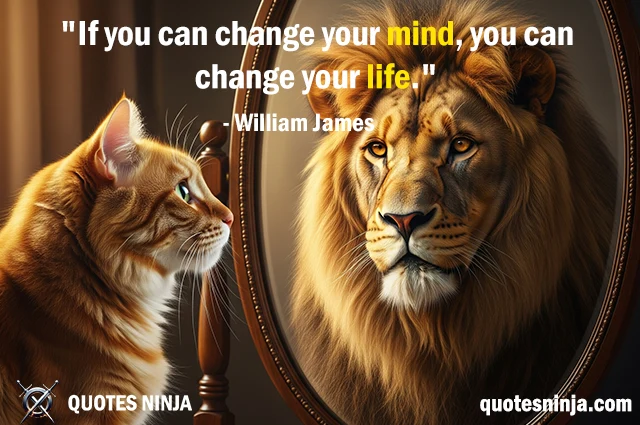
Motivational Quote: “If you can change your mind, you can change your life.” is commonly attributed to William James, an American philosopher and psychologist who is considered one of the founders of modern psychology.
Deeper Meaning of Motivational Quote
The quote “If you can change your mind, you can change your life” speaks to the power of mindset and perspective in shaping our experiences, decisions, and ultimately, our outcomes in life.
Here’s a breakdown of its meaning:
- Your thoughts influence your actions:
The way you think—about yourself, others, and the world—guides your choices. If you believe you’re capable, you’re more likely to take action. If you believe you’re stuck or powerless, you’re less likely to try. - Change begins internally:
Many people seek external changes (new job, better relationships, improved health), but real, lasting transformation often starts with internal shifts—such as letting go of limiting beliefs, adopting a growth mindset, or viewing failures as learning opportunities. - Mindset shapes reality:
Two people can experience the same event but interpret it completely differently based on their mindset. Changing how you think about situations can change how you feel and respond to them. - Empowerment and responsibility:
This quote implies that you have control over your own mind, which in turn gives you power over your life. It encourages personal responsibility and self-awareness.
In short, Changing your mind—how you think, what you believe, what you focus on—can lead to new behaviors, different choices, and ultimately, a transformed life.
Here’s a story inspired by Motivational Quote “If you can change your mind, you can change your life.”
Motivational Story: “From Rock Bottom to Wall Street: A Journey of Unbreakable Will“

Street Corner with Bone-Density Scanner:
Chris Gardner stood on a San Francisco street corner, clutching a bone-density scanner like a life raft. Around him, the city buzzed with motion—people hurrying past in suits, taxis honking, the scent of roasted peanuts in the air. But inside Chris, everything felt still, like a man frozen in time. He had no job, no money, and no place to sleep that night. Most painful of all, he had his young son, Christopher, to care for.
Once, Chris had believed he’d made a smart investment—purchasing medical scanners to sell to doctors. However, as technology advanced and demand plummeted, he found himself with expensive machines and no income. His wife had left, the rent had gone unpaid, and soon, even the shelter became uncertain. Every day felt like a battle for survival.

The Red Ferrari Moment:
At first, Chris’s mind was filled with frustration. He thought, why me? Why does everything have to be so hard? But one afternoon, while sitting outside a hospital after a failed sales pitch, he watched a businessman pull up in a red Ferrari. The man wore a crisp suit, and more importantly, he looked happy. Chris, wearing worn-out clothes and a tired expression, couldn’t help but ask him two questions: “What do you do, and how do you do it?”
The man smiled. “I’m a stockbroker.”
At that moment, something shifted in Chris. Until then, he had seen success as something reserved for others—those born into money or connections. But now, an idea sparked. If that man could become successful, why couldn’t he? Chris realized his greatest limitations weren’t external; they were internal. It wasn’t just poverty he had to overcome—it was his mindset.

Chris at the Office, Surrounded by Interns:
Determined to change, Chris made a bold decision. He applied for an unpaid internship at a brokerage firm. Although the position didn’t guarantee a job, it offered something even more powerful: a chance. Still, the odds were stacked against him. Dozens of other interns—all younger, better dressed, and less burdened—competed for one single job offer. Chris didn’t even own a suit.

Shelter at Night:
Yet, he chose to change how he thought. Rather than dwelling on his disadvantages, he focused on what he could control—his effort, his attitude, and his belief in a better future. He arrived early, stayed late, and made more calls than anyone else. He studied at night, often by dim light in homeless shelters, his son sleeping beside him.

Bathroom Scene – Hitting Rock Bottom:
There were days he had to run from work to day-care, then to a shelter, and finally back to studying. Days when they had to sleep in subway bathrooms. Yet through it all, Chris refused to let his mind spiral into despair. He constantly reminded himself: If I keep pushing, things will change. If I change the way I think about my circumstances, I can change my life.
Transitioning from survival mode to opportunity mode was not easy. He faced rejection, exhaustion, and moments of doubt.
However, each time he felt like giving up, he looked at his son. Christopher believed in him unconditionally. That belief fuelled Chris to believe in himself.

Final Walk After Job Offer:
Eventually, the day came. Chris was called into a room at the firm. He expected another goodbye, another door closed. Instead, he heard the words he had dreamed of: “We’d like to offer you a position.”
He couldn’t speak at first. Emotions swelled in his chest. Then, he shook their hands, stepped out of the building, and clapped silently to himself as he walked into the sunlight. He had done it—not just gotten the job, but changed his life.
And it had all started with a question and a mindset shift.
In the years that followed, Chris Gardner rose through the financial world. He eventually started his own brokerage firm and later became a multimillionaire, motivational speaker, and author. His story, immortalized in the film “The Pursuit of Happiness,” serves as a living testament to the idea that if you can change your mind, you can indeed change your life.
Chris didn’t magically escape hardship; he changed his relationship to it. He shifted from a mindset of victimhood to one of resilience and determination. Through that lens, every failure became a lesson, every setback a setup for a comeback.
Here is the ending of motivational story from the quote “If you can change your mind, you can change your life.”
Moral of the Story:
This story, drawn from real life and portrayed in a powerful film, encapsulates the essence of the quote. Chris Gardner’s transformation was not just about getting a job—it was about changing how he saw himself and his possibilities.
Changing your mind isn’t always easy, but as Chris’s journey shows, it’s the first—and most important—step toward changing your life.
To explore more on stories and dive into related ideas, be sure to check out the other posts where we cover all sort of stories related to quotes. Stay tuned for more…..
To explore more on quote topics, be sure to check out the other topics where we cover all categories of quotes. Stay tuned for more…..

